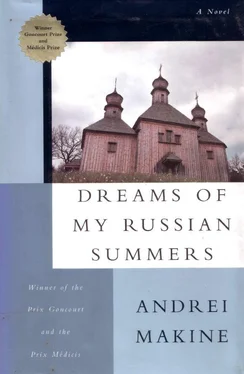I got up, and pushed open the door to the next room. In the half-light of a spring night the room was awake, animated by a subdued expectancy. Even the old fan, though bought only two days ago, looked as if it had lain on the little low table for long years in the nocturnal paleness of the windowpanes.
* * *
It was a happy day. One of those lazy, gray days adrift among the days of holiday at the beginning of May. In the morning I nailed a big coat-rack to the wall in the hall. You could hang at least ten garments on it. I did not even ask myself whether we would need it in summer.
Charlotte's window remained open. Now between the silvery surfaces of the roofs one could see, here and there, the light patches of first greenery.
That morning I added another short fragment to my Notes. I remembered that one day at Saranza Charlotte had talked to me about her life in Paris after World War I. She told me that the postwar era, which, without anyone having any inkling of this, was turning into the years between the wars, had something deeply false about its atmosphere. A false joy, a too easy forgetfulness. It reminded her strangely of the advertisements she used to read in the wartime newspapers: "Warm yourself without coal!" led to an explanation of how one could use "balls of paper." Or again: "Housewives, do your washing without fire!" And even "Housewives, economize: pot-au-feu without fire!" When Charlotte went off to join Albertine in Siberia, she had hoped that when she returned with her to Paris, they would discover prewar France again…
As I noted down these few lines, I told myself that I would soon be able to ask Charlotte so many questions, verify a thousand details, learn for example who the gentleman in the tails was in one of our family photos and why half of this picture had been carefully cut off. And who that woman in a padded jacket was, whose presence among the people of the belle époque had long ago startled me.
It was when I went out at the end of the afternoon that I found the envelope in my mailbox. Cream in color, it bore the insignia of the Préfecture de Police. Stopping in the middle of the pavement, I took a long time to open it, tearing it clumsily.
The eyes understand more quickly than the brain, especially when there is news the latter does not wish to understand. In that brief moment of indecision the eye tries to disrupt the implacable sequence of words, as if it could change the message before the intellect is prepared to grasp their meaning.
The letters danced before my eyes, riddling me with bursts of words, with bits of sentences. Then heavily, the essential word loomed up, printed in large letters, spaced out, as if to be intoned: unacceptability. And, mingling with the throbbing of the blood in my temples, the explanatory formulas followed it: "Your situation does not correspond to…," "You do not combine, in your case…" I remained motionless for at least a quarter of an hour, my eyes glued to the letter. Finally I began to walk straight in front of me, forgetting where I was supposed to be going.
I was not thinking about Charlotte yet. What upset me in these first few moments was the memory of my visit to the doctor: yes, that absurd bending to touch the ground and my eagerness to do so now seemed to me doubly useless and humiliating.
It was only on returning home that I really grasped what was happening to me. I hung up my jacket on the coatrack. Beyond the inner door I saw Charlotte's room… So it was not Time (oh, how wary one must be of capital letters!) that threatened to thwart my project, but the decision of this petty public official, by means of a few sentences on a single typewritten sheet. A man whom I would never know and who only knew me obliquely through the forms I had filled in. It was to him, in fact, that I should have addressed my dilettante prayers…
The next day I lodged an appeal: "an appeal for grace" was the term for it in the letter. Never had I written a letter so falsely personal, so stupidly arrogant and so imploring at the same time.
I no longer noticed the days slipping by May, June, July. Here was this apartment that I had filled up with old objects and with feelings from times past, this disaffected museum of which I was the useless curator. And the absence of the one I awaited. As for the Notes, I had not added a single one since the day of the refusal. I knew that the very nature of this manuscript depended on that meeting, our meeting, which despite everything I still hoped to be possible.
And often during those months I had that recurring dream that woke me in the middle of the night. A woman in a long dark coat entered a little frontier town on a silent winter's morning.
* * *
It is an old game. You select an adjective expressing an extreme quality: "abominable," for example. Then you find a synonym for it that, while being very close, expresses the same quality slightly less strongly: "horrible," if you will. Next time there will be the same imperceptible dilution: "awful." And so on, descending each time a tiny amount in the stated quality: "wretched," "intolerable," "disagreeable"… To arrive eventually at quite simply "bad" and, going via "mediocre," "average," and "so-so," to begin to climb the scale again with "modest," "satisfactory," "acceptable," "suitable," pleasant," "good." Arriving, a dozen words later, at "excellent," "wonderful," "sublime."
The news I received from Saranza at the beginning of August must have followed a similar modification. For, transmitted first to Alex Bond (he had left Charlotte his telephone number in Moscow), this news and the little package that came with it had been a long time in transit, passing from one person to another. At each transmission its tragic import was reduced, the emotion was eroded. And it was almost on a jovial note that an unknown man told me over the telephone: "Listen, I've been given a little packet for you. It is from… I don't know who it was, anyway your relative who has died… In Russia. I expect you've heard about it already Yes, well, she's sent you your testament, eh, what…"
He had meant, jokingly, to say "your inheritance." By mistake, thanks in particular to that verbal imprecision that I had often noted in the "new Russians," for whom English was becoming their principal working language, he had used the word "testament."
I spent a long time waiting for him in the foyer of one of the better Paris hotels. The cold emptiness of the mirrors on each side of the armchairs corresponded perfectly to the blank that filled my gaze and my thoughts.
The stranger emerged from the lift, stepping aside for a tall, dazzling blond woman, with a smile that seemed directed at everyone and no one. Another man, very broad shouldered, followed them.
"Val Grig," the stranger introduced himself, shaking me by the hand, and introduced his companions to me, specifying, "My flighty interpreter, my faithful bodyguard."
I knew that I could not avoid the invitation to the bar. Listening to Val Grig would be a way of thanking him for the service rendered. He needed me in order to enjoy to the full the comfort of this hotel, his new status as an "international businessman," and the beauty of his "flighty interpreter." He held forth about his own triumphs as well as the Russian disaster, perhaps not realizing that a hilarious relationship of cause and effect was thus unintentionally established between these two subjects. The interpreter, who had certainly heard these stories many times before, seemed to be asleep with her eyes open. The bodyguard, as if to justify his presence, glared at all the people who came and went. "It would be easier," I suddenly thought, "to explain how I feel to Martians than to these three…"
I opened the package in the Métro train. One of Alex Bond's visiting cards slipped onto the floor. There were a few words of sympathy, excuses (Taiwan, Canada…) for not having been able to hand me the package in person. But, above all, the date of Charlotte's death. September 9 of the previous year!
Читать дальше












